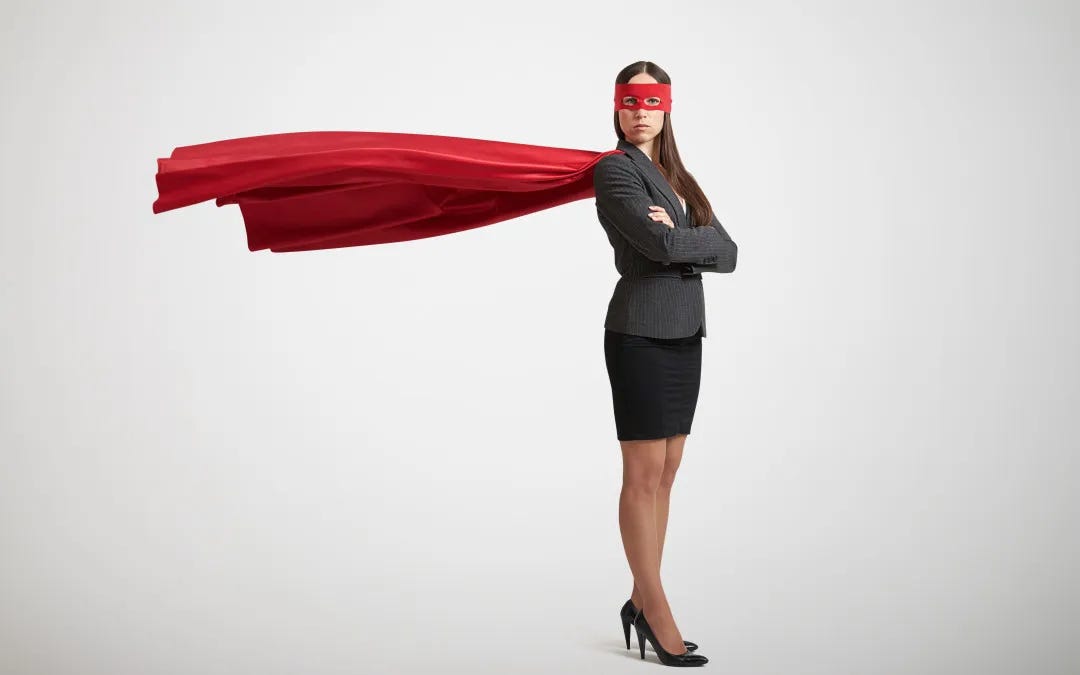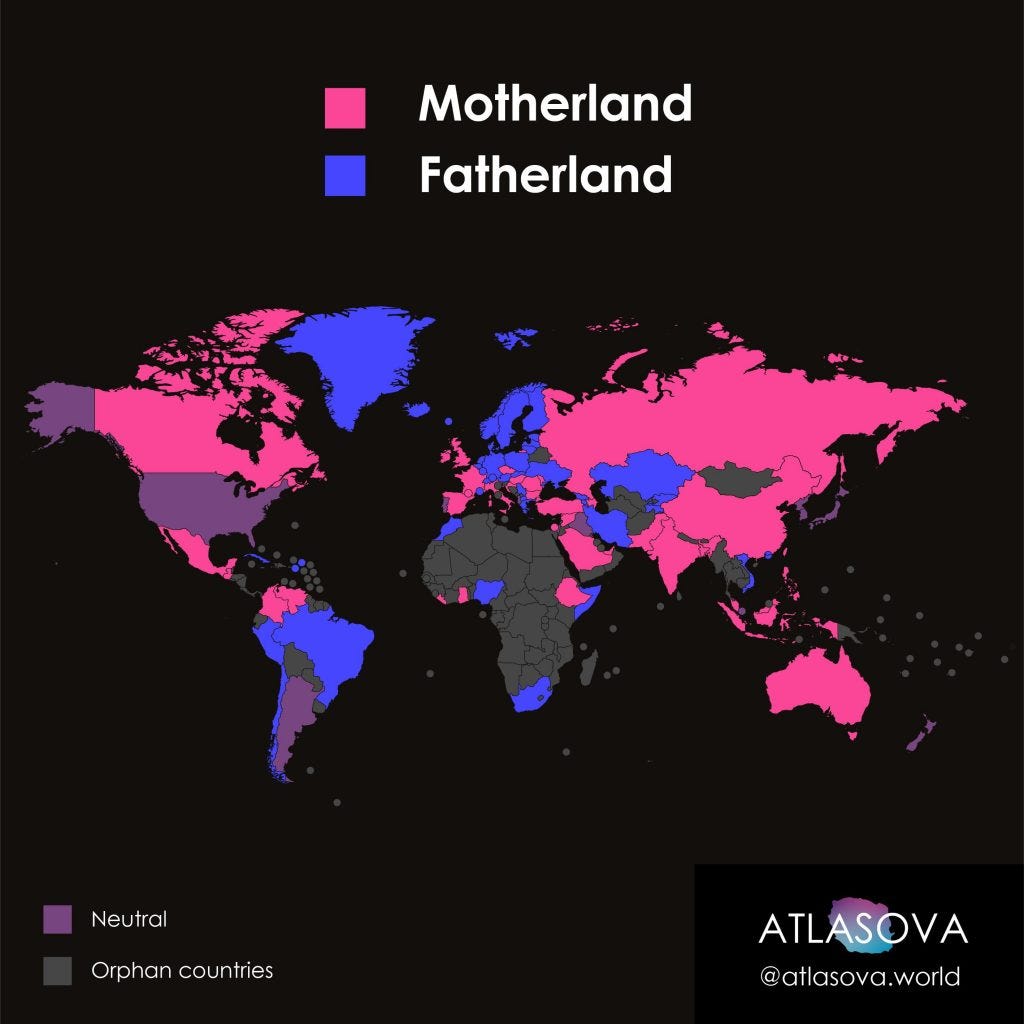When Women Lead
Time to Rid Ourselves of the 'Superwoman Dynamic'
‘If I were a woman’ — A male life coach speculates
I was trolling through TikTok when I came across a short video that stopped me in my tracks. It was by Danny Morel, ‘life coach to thousands’, and he was talking about what would happen if he were a woman.
‘Okay?’ I thought. This should be interesting …
So Morel explains. After a quick detour through his understanding of a woman’s experience — hormones, menstrual periods, pregnancy — he homes in on his key message, which is clearly directed at men. Here it is:
Given that it is a woman’s natural disposition to give life and love, it is therefore the man’s duty to provide. In other words, bring home the bacon. Provide the paycheck. That’s his role.
Unfortunately, he adds, many men — he calls them the “unconscious men” — are obsessed with the need to see results. Concrete results. And they don’t see any “results” (aka $$) in the love and support provided by women. What these unconscious men fail to recognized, according to Morel, is the critical support role women play in helping them become the best version of themselves.
In a nutshell, women were put on the earth to help men become all they are meant to be. That’s where their value lies.
I must admit I was floored.
I suppose it’s entertaining in a way to see a ‘woke’ male doing his best to instruct these ‘unconscious men’ on why women have value …
But let’s get real.
When it comes to gender roles, that Pandora’s box has been well and truly opened and it seems the ‘order nature has intended’ is no longer the absolute truth. Generations of men, failing to recognize or give credit to the women in their lives, have pushed women to not only stand up and demand, but to go out and gain personal recognition and respect in other arenas. Women are slowly but surely taking their place in society, outside of the home, and increasingly in corporate life.
Father or Motherland?
Gender role reversal is, and has been, more common than we think throughout the ages. Just as there are stories of illustrious and brave kings handed down through generations, so too are there tales of valiant queens who took the place of their men and fought valiant wars for their motherland. Interestingly, it is called motherland in most countries, rarely fatherland!
To understand the above, take a look at this map of the world (Lu, 2022):
More of the world refers to their native land as their Motherland — a place that nurtures and grows. Despite this, we still don’t know how to manage things when there is a woman leader in place.[1]
This question has long intrigued me.
When women bring home the bacon – My study of role-reversal on the home front
Recently I completed a second master’s from INSEAD – the Executive Master in Change program — and my thesis spotlighted this model in which the woman is the primary earning member and the man, the primary caregiver/homemaker. I explored the lives of four remarkable women, and their equally remarkable partners (in my case, they were all married) and studied their journeys closely. They were amazing in their sharing and even now when I read the transcript of my notes, I learn something new. In this article, I would like to explore the role of the organization in helping such women deliver the best.
As organizations build on their Diversity, Equity and Inclusion (DEI) agendas to accommodate women who are assuming bigger roles and responsibilities at work, and of men taking on additional responsibilities at home, the changing dynamic of the couples themselves is undergoing significant stress. This change for couples involves not just the redefinition of role identities between themselves, but also within the ecosystem they operate in. When undertaking my research, it became apparent that there is very little data available on the world of couples where this role reversal is established, and I had to personally work through the discomfort of discussing the role reversal situations, especially amongst Asian couples. While most couples have come to terms with it between themselves, I found the broader impact on society and professional environments to be extensive (Puranik, 2022).
The ‘superwoman’ dynamic
In my thesis, three of the four couples — Joe and Jane, Paul and Mia, and George and Louise — had developed their individual role arrangement when the woman’s career was on a strong trajectory, and the men, due to different circumstances, had adopted the homemaker role. It wasn’t a natural choice and there was a lot of resistance, before acceptance finally set in. Initially, these women started in the traditional roles of managing family and home, despite having careers of their own, but over time they eventually took ownership of being the primary breadwinner. Louise was posted overseas and so George followed; Mia had a stable career while Paul did a few start-up roles. And in the case of Jane and Joe, Jane found a job first when they relocated, but Joe eventually gave up after searching long and hard for a position that fit with his experience.
How have Jane, Mia and Louise coped with this and what have their companies done to support them?
As we spoke, I discovered that the women continued to flex across their roles as a caregiver and professional, almost overcompensating for having taken on the breadwinning role. This manifested in either letting their partner get a lot more space than what most traditional relationships exhibit or by stepping in to be the ‘superwoman’ and, in some cases doing both.
As one participant shared:
“At first, it was easy to manage both expectations, your family and your work but there is a point, especially if you grow pretty fast and far in your career, it was just impossible. You can't be at every parent teacher conference; you can’t put the kids in bed every single night. You can't just do it and it's impossible…. so, it came to a point that either you put yourself in danger or you live with horrible guilt or you accept that some people will judge and that’s okay.”
Within these couples, women continue to feel guilty about having taken on ‘her man’s’ role. I noticed a strong sense of having to ‘make up’ for it amongst the women. In a bid to maintain both sides, men were being given more space as the homemakers and caregivers. The more space they were given, the more the women flexed — some out of gratitude for the lives they were able to lead, others with profound guilt for what they were missing out on with their children that a ‘traditional mother’ might experience.
What does this mean for organizations?
Within this context, the next question to ask is how are organizations supporting this in their DEI charter? Companies have been on a major leadership diversity drive and that means more such women are being promoted quickly and more often into leadership roles. They are having to balance this increased work pressure with the guilt and conflicted feelings they can hold in their hearts related to motherhood.
Who is paying for this and who is winning in this new reality?
Are such women getting penalized for trying to manage everything or seen as ‘desperate enough to stay’ and thus not getting the same opportunities that men would?
The leaking diversity leadership pipeline is a stark reminder to companies of this. Men might argue that women are more supported than they were on their own leadership journeys, but in today’s world, that is needed.
Until women grow comfortable in their own skin as breadwinners — and I saw this in one of the younger couples I interviewed who had gotten married with this very clear approach that the wife would be the primary breadwinner — until they can build the muscle, like men, to forget all about home and children the moment they step into the office, and until they can overcome the emotional turmoil of, for example, leaving a sick child at home in the man’s care and not worrying about it, support will be necessary.
Only when women are able to establish the necessary support within their environment and the required mindset within themselves will they be able to forego the ‘superwoman’ complex and reach some form of equilibrium. And only then can we treat everyone equally.
Sources
Lu, C. (2022). Fatherland vs. Motherland – What Is the Gender of Your Country? Retrieved from www.mcislanguages.com: https://www.mcislanguages.com/fatherland-vs-motherland-what-is-the-gender-of-your-country/#:~:text=%E2%80%9CFatherland%2C%E2%80%9D%20on%20the%20other,home%20country%20as%20a%20male.
Puranik, A. (2022, June). Uncharted Territory: When Mommy Goes to Work – and Daddy Stays at Home! [Master’s Thesis, INSEAD]. INSEAD Library.
[1] This article, like my research, focuses specifically on the heterosexual relationship model. However, future research on same-sex couples could reveal important new insights. I look forward to reading and learning from those studies.





